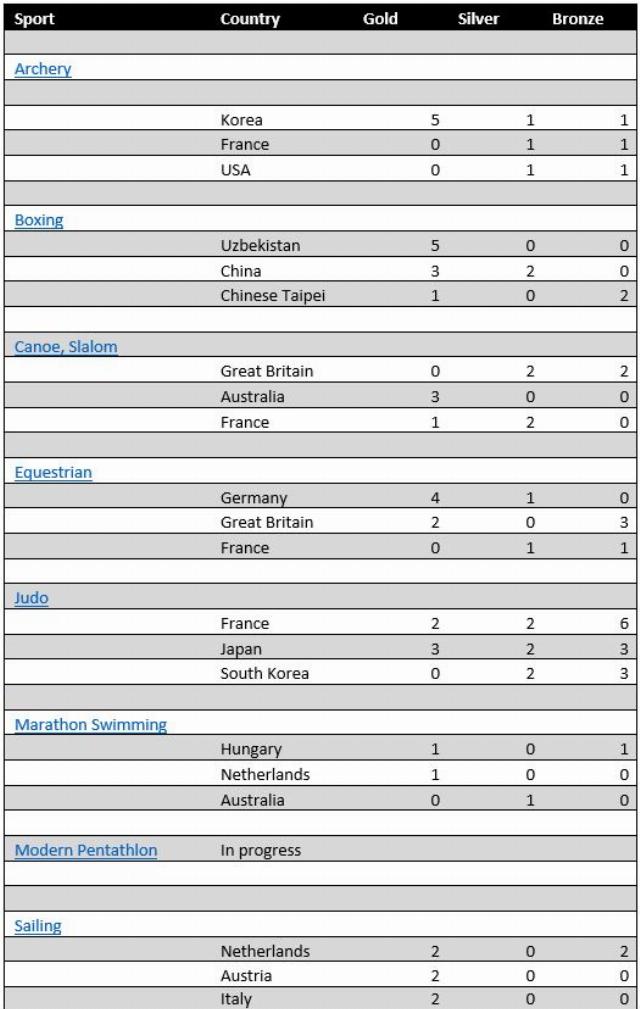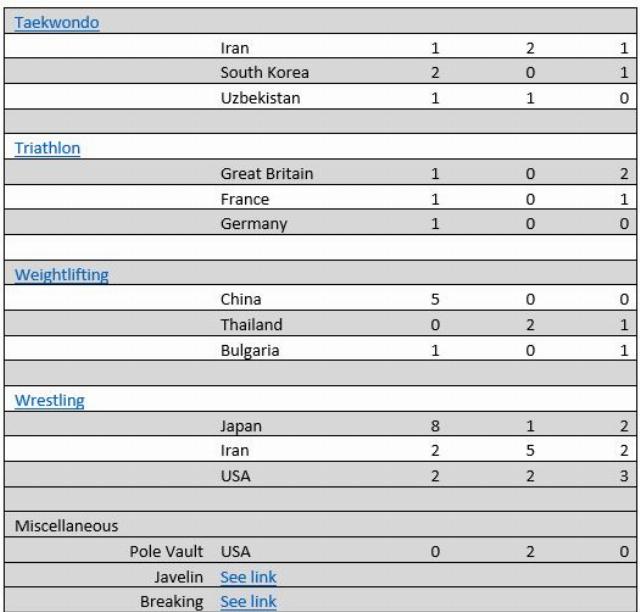My practical Olympic medal table
The Olympic Games in Paris are almost over.
How did the medal count go?
Having identified Olympic events with real-world applications, here’s my summary of the final Olympic Medal Table that shows the top three countries for such events, which is obviously not all of them.
So why did I choose those?
The International Olympic Committee ranks by gold medals won, but in the U.S., we tend to rank by total medal count, especially since it benefits us. Another method might consider sports that actually represent something practical, past or present.
Alternative medal tables have been constructed using metrics such as medals per country per capital.
But I was thinking: How about a table that lists medals won in sports whose skillset had, and has, practical implementations throughout human history? This instantly rules out events such as rhythmic gymnastics, artistic swimming, skateboarding, water polo…etc.
In Paris, there were 32 categories of sport comprised of many more individual events. For example, sailing is a category that has 10 separate events. The table below shows medal counts by country where the sport/event is deemed to have adaptable purposes.
I made this chart:
Links are here: Archery; Boxing; Canoe, Slalom; Equestrian; Judo; Marathon Swimming; Modern Pentathlon; Sailing; Taekwondo; Triathlon; Weightlifting; Wrestling; Pole Vault; Javelin; Breaking.
First ranking is on total medals. Sports are linked to source data, effective 0600 PST, August 11, 2024.
First, here’s justification for the sports/events included:
Aquatics, Marathon Swimming: There are so many swimming events that it took a week to squeeze them in. Most emphasized speed, a reflection of the Olympic motto: “Faster, Higher, Stronger.” However, swimming speed has few practical applications; no human will be able to outswim a hungry shark, for example. But marathon swimming could prove useful in making it back to shore if one’s vessel is not seaworthy.
Archery: Since were focusing on past and present, the skills represented by this event are similar to those deployed by Robin Hood and his Merry Men in confronting the Sheriff of Nottingham – or any other tyrant. Beyond Robin Hood’s legend, archery had played a significant role in human struggles.
Athletics (Javelin and Pole Vault): While the Olympic motto captures the essence of many track events, some field events correlate to practical human use. Forms of the Javelin have been used in warfare, and their utility is useful in hunting. As for Pole Vault, well, sometimes one has to scale an enemy's walls, or even a castle’s ramparts.
Boxing: This was an event in the original Olympic Games.
Canoeing, Slalom (again, not considering sprint): Many useful deployments throughout history. Even Lewis and Clark carved canoes for their journey. The Slalom event resembles the type of rapids an explorer might encounter on a wild river.
Equestrian, eventing: This is a sort of equestrian triathlon including dressage, cross-country, and show jumping. Obviously, such equine abilities are deeply entwined with human progress.
Judo: Could always come in handy when hand-to-hand fighting erupts, though it should be noted that U.S. Navy SEALs also learn Jiu-Jitsu.
Modern Pentathlon: Events include swimming, equestrian, laser pistol shooting, and cross-country running.
Sailing: While explorers like Columbus and Captain Cook used larger vessels like a three-masted carvela redonda, smaller sail boats were also deployed to come to shore while the mothership remained anchored in deeper water.
Taekwondo: Another martial art with clear practicability in vanquishing one’s enemies -- who get too close.
Triathlon: The ability to swim, bike and run long distances could be useful for infiltrating hostile zones.
Weightlifting: It requires brute strength to build the infrastructure that wrestles comfort from the clutches of nature, and facilitates commerce and travel.
Wrestling: With renewed circumspection, police forces still have to occasionally wrestle around to restrain unruly suspects.
Breaking: This new Olympic sport may seem practically superfluous now, but something similar may have enhanced a court jester’s repertoire. Jesters played various roles in courts, including dancing and prancing through the streets, which sounds a bit like break-dancing. Anything to stay on the good side of the King or nobleman was highly practical as humans endured the Medieval Ages.
Image: Anne Jea. via Wikimedia Commons // CC BY-SA 4.0 Deed
FOLLOW US ON
Recent Articles
- Transgender Armageddon: The Zizian Murder Spree
- Jasmine Crockett, Queen of Ghettospeak
- The Racial Content of Advertising
- Why Liberal Judges Have a Lot to Answer For
- Dismissing Evil and Denying the Holocaust — What’s the Endgame?
- The Witkoff Warning: Will Jordan’s King Fall?
- Can Trump Really Abolish the Department of Education?
- Carney’s Snap Election -- And Trump Saw It Coming
- We Can Cure Democracy, But Can We Cure Stupid?
- George Clooney: Master of Cringe
Blog Posts
- Two new revelations about the Signal leak, along with two theories
- Big Tech’s Invisible Hand: How Google and Meta manipulate our elections
- New report: Netherlands is now euthanizing minors
- Tantalizing tidbits: Five news stories about leftists, and sea lions, acting aggressively
- Rockets to Roses: Israel’s bizarre trade cycle with Aza
- Fort Knox? Gold cams!
- There is no birthright citizenship for illegal aliens
- Turn off the phone. Close the laptop.
- Nine reasons Democrats are doomed to irrelevance
- Wagner College should restore Trump’s honorary degree—and set a national example against cancel culture
- The Signal Scandal was a nothingburger, but the WSJ takes the opportunity to attack Vance
- The Trump effect: An unprecedented investment surge and economic renewal
- Hydrocarbon-friendly Trump a match for energy-hungry India
- And Big Bird can’t sing
- The DC appellate court order affrming Judge Boasberg dishonestly ignores its lack of jurisdiction








